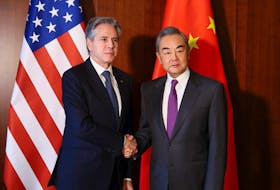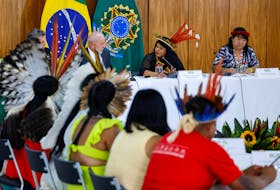TRURO, N.S. – Five years ago, Joel Adams adopted a vegan diet for the health benefits.
Today he’s still vegan, but the reason has changed.
“It did help health-wise, but as I learned more, my main reason for being vegan became the welfare of animals, with the environment a close second,” he said.
“I believed I needed animal products at first, but now I know I don’t, and learning more about the animals changes your perspective.”
For a short time, he ate a vegetarian diet, but after about three months cut out all animal products.
Adams said, although he lost a considerable amount of weight after first becoming vegan, he gained most of it back after discovering vegan treats.
“There are a lot of choices in vegan diets, and I don’t view meat as food anymore.”
His wife, April Sanson, became vegan about three months after he did.
The couple live in Hubbards, but are often in Truro, where Adams grew up, to visit family and friends.
“We have a few places in Truro where we can go out to eat,” he said. “Social gatherings can be difficult, and we often bring our own food to those. We don’t usually mention we’re vegan until we know people for quite a while.”
Shannon Crowe changed her diet after watching documentaries and reading articles about animal welfare. She’s been vegan for three years, and was vegetarian for one year before that.
“When I watched documentaries, I saw the conditions animals were in on factory farms; there was no quality of life at all,” said the Bible Hill woman. “When you see neatly-packaged meat at a grocery store, you’re not aware of the process behind it.
“I watched a video about dairy and learned how calves are taken from their mothers when they’re small so that people can drink the milk.”
She also looked at the environmental impact of meat.
“A lot of deforestation takes place to grow crops to feed animals raised for meat. The ecosystem is being destroyed, rainforests are being demolished, enormous amounts of water are used. If you consider yourself an environmentalist I don’t see how you can eat meat.
“People talk about plastic straws, but the amount of damage they cause is small compared to the meat industry and fishing. The best way to help the earth is to avoid meat and dairy and eggs.”
Crowe found the most difficult food to give up was cheese, but she no longer misses it. She uses dairy free cheese when making meals. Like many vegans, she takes B12 supplements and eats B12-fortified foods to ensure she gets enough of that vitamin.
Although her husband and stepson eat meat, they are supportive of her choice.
Adams and Crowe, both in their early 30s, are in the age group – under 35 – that sees the most dramatic increase in veganism, but John van Gurp became vegan at age 54. He changed his diet, three years ago, for health reasons.
After he noticed a diminished tolerance for exercise, his doctor sent him for a cardiac stress test, which showed he had blocked arteries. After he had stents emplaced, he began reading about heart-healthy diets.
“Everything pointed to a plant-based diet as being the gold standard for cardiac health,” he said. “I changed my diet overnight and it never bothered me. I saw it as a project, so I embraced it. I found it interesting and rewarding. There are so many resources available, and I’ve met a lot of very thoughtful folks. It’s been a great journey of discovery.”
Van Gurp’s new diet helps him keep weight off; his blood pressure is perfect, and when he went in for his last stress test he was told he was fine and didn’t need to return.
“It can be a challenge at restaurants, but they’re starting to get it and chefs seem happy to accommodate a vegan diet,” he said. “I’ve discovered a lot of new tasty foods.
“It now turns my stomach to smell meats cooking.”
His wife is very supportive, and has adopted a vegetarian diet.
Restaurants have made adjustments to their menus to accommodate vegan diets.
“We tweak our menu twice a year, and we can also tweak items on the menu,” said Derek Forsyth, owner of The Nook & Cranny in Truro. “For vegans, we offer multiple options.”
A & W brought out the vegan Beyond Meat Burger in 2018 and were surprised by its popularity, with restaurants quickly running out of stock.
“Our Beyond Meat Burger debuted this summer and the love from Canadians across the country made it our fastest and most successful new product launch ever,” said A&W President and CEO Susan Senecal.
“Some people think being vegan means there’s not much you can eat, but there’s a lot,” said Adams. “It’s not a choice that makes us feel we’re missing something; it’s a choice that’s enriched our lives.”
EXPERIENCE PROMPTS CHANGE IN DIET:
It was her experiences in Australia that prompted Alex Gatto to become vegan. She was on a work program, and being hosted by farmers, when she saw calves being branded.
“I heard the screaming and could smell the burning flesh,” she recalled. “It took experiencing things first hand to make me realize things were wrong.”
She stopped eating animal products in December 2015, and is now president of the Dal AC Veg Club.
“There are a lot of different opinions on campus, and there’s always some negativity with social change, but there are a surprising number of vegetarian students and faculty,” she said.
“A lot of people have the idea that vegans are anti-farmer. We’re not, we just want more of them to be into more compassionate and sustainable types of agriculture.”
Gatto said there’s no food she misses, and becoming vegan has helped her discover a love of cooking she’s never had before.
KNOW THE TERMS:
Vegan: A vegan does not eat meats, eggs, dairy, or any other animal-derived products
Vegetarian: A lacto-ovo-vegetarian does not eat any meat, but will sometimes eat dairy products and eggs. A lacto-vegetarian doesn’t eat meat or eggs, but does consume dairy products. An ovo-vegetarian doesn’t eat meat or dairy products, but does eat eggs.
Pescatarian: A pescatarian does not eat any meat except fish.
Flexitarian: A flexitarian is a person who follows a vegetarian diet most of the time, but occasionally eats meat.








